American Civil War historiography and publishing blogged daily by Dimitri Rotov.
8/31/2005
Holiday schedule
8/30/2005
Lincoln's depression
Widow of the South - more reviews
New York Daily News: "Somewhere in The Widow of the South is a plot. It's buried, though, by the florid prose and straying story lines in a Civil War novel that offers more hysteria than history."
San Jose Mercury: "The Widow of the South doesn't have the imaginative depth and lyrical eloquence of Cold Mountain or the mythmaking epic sweep (or the sentimentality and racism) of Gone With the Wind. But what it does have is a shrewd author who knows and loves what he's writing about, and that helps give his book its narrative drive and emotional impact."
USA Today: "... the battle's carnage, as well as the poverty, hunger and terror experienced by a defeated South, takes a back seat to Hicks' pretentious meditations on maternal grief, God, love, death and morality. By the end, the reader is ready to holler, 'Scarlett, come home,' 'Inman, take me to Cold Mountain' or 'Ken Burns, load that DVD.'
Orlando Sentinel: "Though undeniably riveting in many respects, The Widow of the South is not without significant flaws. [...] Perhaps its greatest virtue, aside from bringing Carrie McGavock into the historical limelight and serving as a stirring elegy to the Blue and the Gray, is its indictment of war as our greatest inhumanity to man."
Man's inhumanity to man - I'm trying to remember which 1960s comedy show used that cliche as a running gag - but never mind. I think it's utterly charming that a reviewer could write that line "in this day and age."
Meanwhile, save a little pity for Hicks. Can you imagine your first novel getting this level of scrutiny? It's ranked 783 on B&N's sales chart and 652 on Amazon's.
Crying all the way to the bank, you say? Maybe.
8/29/2005
1 + 1 = ?
McPherson, exemplifying the ACW history consensus, believes that there is no new talent in Civil War publishing under the age of 40. He said so himself. Since he cannot see non-conforming history, or if he sees it he discounts it, the statement means that he cannot see any historians under 40 of his own ilk.
Perhaps the two statements (Sears' + McPherson's) together point to the end of consensus ACW history.
The Widow of the South - reviews begin
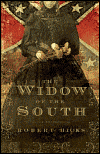 The first reviews are popping up for Robert Hicks' The Widow of the South - a first novel that has presold over 200,000 copies on Amazon.
The first reviews are popping up for Robert Hicks' The Widow of the South - a first novel that has presold over 200,000 copies on Amazon.The Detroit Free Press: "... the climax of the novel is a huge disappointment."
The Baltimore Sun: "... skips clumsily from perspective to perspective. It wallows in the pathos of war and death. [...] His accounts of the fighting leave no Civil War battle cliche unturned.
8/26/2005
Convergence in Franklin
 Kevin Worley (right), publicizing the new documentary "Battle of Franklin: Five Hours in the Valley of Death" was good enough to respond to a recent posting here by pointing to more information in a press release.
Kevin Worley (right), publicizing the new documentary "Battle of Franklin: Five Hours in the Valley of Death" was good enough to respond to a recent posting here by pointing to more information in a press release.The release (issued by Wide Awake Films) points to a convergence of interest that might develop from the film complementing the as-yet unpublished bestseller Widow of the South, a Battle of Franklin centered novel. (In May, when we checked in on Amazon sales they were low. The preorders have since hit 200,000, according to Wide Awake. Widow is the author's first novel.)
Meanwhile, filmmakers and author have teamed up to help reclaim the battlefield from Franklin golfers.
(p.s. The Wide Awake site has a variety of ACW documentary clips to browse. Go here and notice the Demo Reels control panel at left, then scroll down within that panel to the Museum/Documentary section.)
Richard F. Miller has the goods
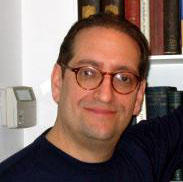 Russel Beatie's website lost a lot when it took down his draft chapters of unreleased volumes. (Not, before I nabbed a few pieces of his unreleased Volume III of Army of the Potomac, however).
Russel Beatie's website lost a lot when it took down his draft chapters of unreleased volumes. (Not, before I nabbed a few pieces of his unreleased Volume III of Army of the Potomac, however).Richard Miller (right) has a book coming out next month called Harvard’s Civil War: The History of the Twentieth Massachusetts Volunteer Infantry and you can sample it (obliquely) by reading a couple of related article on his website: "The Trouble wtih Brahmins:, Class and Ethnic Tensions in Massachusetts' Harvard Regiment" and "Brahmin Janissaries:, John A. Andrew Mobilizes Massachusetts' Upper Class for the Civil War."
There are more articles on this regiment, all well worth reading.
Free samples - always a good thing.
Tennessee’s Radical Army
... the State Guard ... [offset] ... the Klan [which] terrorized large portions of the state. The State Guard was not deployed in 1868, and both the Republican party and freedmen suffered as a result."These reviewers note,
... the State Guard [was created] in order to enforce the law and protect the Reconstruction process along with a law giving the right to vote to male African Americans.Disbanded in 1868, it exists today outside of the National Guard system.
Those lovable canine thespians
 Here's a long feature about "Dog Jack," an independent Civil War movie.
Here's a long feature about "Dog Jack," an independent Civil War movie.The original Dog Jack was so highly regarded by the unit's soldiers that Confederate prisoners were exchanged for him when he was twice captured by the enemy. [Reenactor] Hoover was similarly taken with the canine actor that portrayed Jack, a female pit bull terrier named "Piglet."When did terriers become "pit bull terriers"? And how will makeup compensate for this player's anatomical unfitness for the role?
"You fell in love with her," Hoover said. "If she liked you, she'd jump right up on you." Hoover was amazed by Piglet's intelligence and her ability to work with owner and handler Tracy Doyle, even though the dog is deaf. Doyle directed the canine performer with hand signals. Piglet looks remarkably like the original Dog Jack, whose portrait hangs in Pittsburgh's Soldiers and Sailors Memorial Hall.A deaf dog starring in a heartwarming role. Somebody get me an "Oscar material" cliche.
Friday housekeeping
Blogger used to give a statistical summary in the profile section - number of posts published and number of words to date. It no longer does. When I last checked, months ago, the blog was approaching 250,000 words. Maybe a new War and Peace should have been written instead.
Nevertheless, if a keyword search has brought you to this site, chances are the topic has been covered before. Search the site itself as described in item one, below, and you probably won't be disappointed.
Some points of interest.
(1) You can search within this site by using the little box in the upper left hand corner of any page.
(2) You can link to any post directly by clicking on its datestamp (at the bottom). That causes the post to come up in its own window with its own unique URL.
(3) This is a consumer site concerned with "product" quality. It's also concerned with the product quality of "public history" in its various forms.
(4) There are plenty of clues around as to how to reach me if you wish to and I thank those who have taken that trouble.
(5) If my criticism is sometimes overdone, take it with a grain of salt. I regret any unnecessary harshness. A lot of bad history is produced by good people.
Thanks for visiting.
8/25/2005
And now for something completely different...
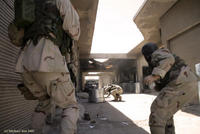 ... some serious combat blogging.
... some serious combat blogging.I try to keep the current war at arm's length, but this piece is exquisite.
The shirkers who will not do their duty as infantry to "close with and destroy the enemy" - yards away from an enemy trying to kill friendly wounded - overwhelmingly resonates with the American Civil War.
As does the battalion commander and his sergeant major acting as close combat spearheads in hand-to-hand combat. If only the new men would follow them... If only the new men would act their part... but they don't.
Shades of S.L.A. Marshall.
Many thanks to superblogger Michael Yon, with a hat tip to Instapundit. (Photo by Michael Yon.)
Fischer and McPherson
 Mark Grimsley has received a commission from David Hackett Fischer (right) and James McPherson and it's causing him to wonder about the significance of 1864. (He's got a lot of good ACW stuff up, by the way.)
Mark Grimsley has received a commission from David Hackett Fischer (right) and James McPherson and it's causing him to wonder about the significance of 1864. (He's got a lot of good ACW stuff up, by the way.)Grimsley is well regarded in this blog, as you can tell.
However, the collaboration of Fischer and McPherson causes me to wonder if Fischer has relaxed his old professional standards and is prepared now to overlook incomplete historical rationalizations, reductive fallacies, the elimination of historic contradictions, not to mention causality compressed to the point of malfunction - which he once decried and any of which sins can be found in Battle Cry.
If Fischer (rightly) previously numbered David Donald among the ignoratii (his term!), what must he thinking of his new helpmate?
More vandalism
A young man was charged this week with desecrating a 142-year-old corpse, kicking in the door of the Civil War-era tomb, pulling apart the skeleton, and posing for pictures with the skull and other bones.
8/24/2005
"Wesley McClellan" rides again
 In the long-ago early days of this blog, there was a now-forgotten election in which much was made by many comparing George B. McClellan with a candidate named Wesley Clark (top right). I wouldn't expect readers of such enduring literature as blogs (esp. this blog) to get caught up in the passing ephemera of presidential elections, so let me link you to a painfully long post in which I then summarized all the Clark/McClellan comparisons being made.
In the long-ago early days of this blog, there was a now-forgotten election in which much was made by many comparing George B. McClellan with a candidate named Wesley Clark (top right). I wouldn't expect readers of such enduring literature as blogs (esp. this blog) to get caught up in the passing ephemera of presidential elections, so let me link you to a painfully long post in which I then summarized all the Clark/McClellan comparisons being made.One of the more deeper of these was based on the Centennial doctrine of Civil War history aggragated and synthesized by commentator Rush Limbaugh into an opinion piece called "Wesley McClellan."
If you saw Ken Burns' stuff or have ever read McPherson, Sears, Davis, Catton, Williams, Williams, or Nevins, you'll have been thoroughly prepared for "Wesley McClellan."
Contending with "Wesley McClellan," I wrote that "And as for Lincoln's opponent McClellan, none of the talk show hosts has any idea he was a war Democrat or a conservative. Karl Marx and Friederich Engels backed Lincoln over McClellan, which should be all a talk show host needs to know." (Chris Cross, a political blogger and occasional reader of these screeds, saw the post and linked to it, so I suspect that Marx-and-Engels-for-Lincoln has some novelty value.)
Author Richard F. Miller was good enough to alert me now to a new piece (transcript) in which Limbaugh has again revived the Centennialists' pantomime McClellan, this time to condemn politicians soft on the war. Miller notes how certain pop history themes leach into the common discourse. Limbaugh:
Let me give you a name. Remember George McClellan? General George McClellan. He never had enough troops; he never had enough equipment. No situation was ever the right situation to attack Lee in the Confederacy. He was always complaining. He didn't have what it took, so Lincoln finally said, "You're outta here, buddy." He canned him. That's what we have in these politicians today. They're all McClellans. None of them are Lincolns. [Link as posted in the original - click on it, it's representative of the quality of McClellan criticism.
]
"... I believe that [Limbaugh is] a bit over his head here," writes Miller. Indeed, as were the Centennialists who set the scene for this vaudeville McClellan character.
All of which reminds me of a story.
When Limbaugh's Wall Street Journal piece "Wesley McClellan" was reprised on the commentator's website, his webmaster chose for a time to illustrate the text with a book cover (right) linked to an Amazon shopping cart.
The book was Jim Ridgway's Little Mac: Demise of an American Hero. The subtitle gives it away: it was the one book in print carried by Amazon, aside from a kids' tome (George B. McClellan: the Disposable Patriot), that gave a full blooded defense of "our George."
Ridgway, a fellow member of the McClellan Society, couldn't believe his eyes when I pointed him to the web page and we speculated about a book sales boost ... after having a laugh about unintended consequences.
Good things can sometimes come from bad history.
English Civil War: mind your head
Visitors to Ludlow Museum will still to be allowed to try on Civil War helmets despite an "unfortunate" incident when a man got one stuck on his head. However, the museum has now put up a warning sign stating they are only really suitable for children.
Franklin documentary out
8/23/2005
Forming opinions
... the way that modern Britons form their ideas about the war as historical event - what it was like and what it was meant - from literary sources - either the poetry they are taught in schools or the modern popular fiction which uses the war (WWI) as a setting.On the ACW side, there is nothing like the body of literature around WWI. On the other hand, the ACW does see a steady stream of bestselling potboilers and I have long wondered if the fiction reader can be classified as part of the Civil War audience.
I took part in a colloquium on 'Periscope and Telescope' at Wolfson College Oxford. The aim was to bring together 'literary' and 'military' historians to discuss 'conflicting views of the Great War'.We need a Civil War a symposium like that in the US.
In a session set up as a debate, I was asked to speak against the motion that 'Historians need creative imagination as much as imaginative writers need historical information'. Facetiously, I opposed it on the grounds that it was insufficiently strong: historians need far more creative imagination (whether in devising a methodology, analysing incomplete information, or writing without committing the crime of 'psychological anachronism') than do imaginative writers. [My emphasis. There is analysis and then synthesis.]
[...]
The problem for many historians of the war is that readers tend to accept these works of historical fiction as accurate pieces of reconstruction. This suspension of disbelief is probably true of all historical fiction, but is particularly the case for a war in which many Britons still feel bound up by myths of family involvement. Like many of my colleagues, I have had otherwise perfectly reasonable and intelligent people tell me that books like Birdsong or Regeneration told them the 'truth' about the First World War.This frustrates historians for three reasons: 1) we see the errors, plagiarism and anachronisms, 2) we can't understand why readers get confused between fact and fiction, 3) some of these books sell in quantities we could only dream about and reach audiences we never will.
Civil War history from the cricket papers
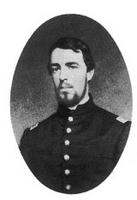 America is not generally remembered as a world force in cricket, except in the columns of cricket periodicals.
America is not generally remembered as a world force in cricket, except in the columns of cricket periodicals.Cricketer International has a nice article on American star Walter S. Newhall (right), who was killed in 1863 after stints on the staffs of Fremont and McClellan.
During the summer of 1859 he showed the stuff of which he was made by scoring 549 runs for the Young America Cricket Club in the Philadelphia competition and set local tongues wagging when he scored 105 against the Delphian Cricket Club.(The Philadelphia Cricket Club revived the game in 1998 after six decades of neglect.)
In later years the Newhall family emerged as one of the most prominent cricket playing families in the history of the sport. No less than six members represented the United States of America against Canada, England, Ireland and Australia between 1859 and 1912. During the match between the United States and Canada at Nicetown, Pennsylvania on September 13-14, 1880 cricket history was made when four Newhall brothers (George, Daniel, Robert and Charles) appeared for the US.
Notes of Army and Prison Life: 1862-1865
8/22/2005
ACW book sales 2005 - Grant books
 Time for some do it yourself trend analysis.
Time for some do it yourself trend analysis.I have here laid out the Ingram sales figures for some recent Grant books, with McFeely's older Pulitzer-winner thrown in for reference. The 2004 sales figures are just that; 2005 sales figures include Jan - July. The parenthetical number is the fudge factor total sales guesstimate that some industry watchers use – it is the product of six times the Ingram sales number. Some industry watchers use seven or eight as a multiplier.
So the number in parentheses is "soft," very soft, and I take some license in referring to it as if it reflects total sales for a book. But it's the best I can currently do.
What can we conclude from these figures? Read on and I'll meet you at the bottom of the post.
Bonekemper, A Victor, Not a Butcher (Regnery, 4/04)
2004 – 832 (4,992)
2005 – 75 (450)
Bunting, Ulysses S. Grant (Times/Henry Holt, 8/04)
2004 – 1,152 (6,912)
2005 – 451 (2,706)
Korda, Ulysses S. Grant (Simon & Schuster, 9/04)
2004 – 558 (3,348)
2005 – 204 (1,224)
Smith, Grant (S&S PB 4/02)
2004 – 151 (906)
2005 – 50 (300)
Perry, Grant and Twain (Random House, 5/04)
2004 – 1,433 (8,598)
2005 – 132 (792)
McFeely, U.S. Grant: An Album (Norton 11/03)
2004 -109 (654)
2005 – 7 (42)
McFeely, Grant (revised PB, Norton, 8/02)
2004 – 121 (726)
2005 – 30 (180)
Got your impressions lined up? Here are mine.
First, I'm struck by the number of Grant titles in play at the major houses. The biggies tend to pick and choose their ACW risks carefully, maintaining fairly low Civil War stock from season to season. I wonder how they could all be running the same product, more or less, at the same time and have come up with this story.
My sense is that there was a marketing vibe in publisherland that the time had come for another big-selling Grant book, post-McFeely. Jean Smith's book was a testing of those waters, Smith being a proven pop-historian of the Ambrose/Goodwin type (but with lower sales).
With the commercial failure of Smith's book, it was decided to try again; in one case by Smith's own editor, Michael Korda; in Josiah Bunting's case, he was solicited to do a major Grant reassessment by no less than Ted Sorenson. As a prelude to these effots, McFeely imitated McPherson in issuing a picture book version of his own Pulitzer-winning work. McFeely's foray into coffe-table fare failed (his picturebook numbers are dismal). Meanwhile, the maverick trade shop Regnery sent its own probe forth early in '04 in the form of the utterly obscure Edwin Bonekemper's Victor, not a Butcher.
Bonekemper's book achieved near success for Regnery, given Regnery's scale of production (10,000 sales would have probably sold out the print run, though it is possible the press ran fewer copies than that). It's possible this goaded on the big houses.
It certainly drained off some of their sales; nobody needs three books by three non-specialists saying Grant was a victor not a butcher. So, I think that the potential Grant fan-base got tired out by the end of last year. Look at the "decay rates" on 2005 sales. Those are mid-year figures, so double them and you see - barring a Christmas surprise - no sales approaching 2004 levels.
The sales figures you see are inadequate by trade house standards, across the board. Are they bad enough to put a long chill on future Grant books? Probably in the trade arena; I'm not sure if the university presses will be scared off, however.
(For more on calculating sales numbers, see here and here.)
8/19/2005
Celebrity roundup
Dr. McPherson will "will help steer Britannica's editorial operations while grappling with the implications of digital technologies, globalization and the information explosion." You read that correctly, friend.
"At a time when vast quantities of questionable information are available on the Internet and elsewhere, rigorous and reliable reference works are more important than ever..." McPherson: a rigorous technofile who will help Britannica navigate the digital information explosion.
Doris Kearns Goodwin's Lincoln manuscript (currently on its third title, "Team of Rivals") may actually have been turned in for publication - she is slated to sign copies in a New England bookstore on Nov. 3. Will there be copies on Nov. 3rd? Let us see.
Stephen W. Sears is confused by something Edward L. Ayers wrote. In one part of a new book, Ayers traces the origins of the present groupthink in Civil War history (referred to in this blog as "the Centennial Doctrine"). Sears characterizes this as "today's dominant consensus about the war, exemplified by James McPherson's best-selling Battle Cry of Freedom and Ken Burns's widely watched TV documentary 'The Civil War,'..."
It seems all of Ayers' origin-tracing involves the academy, "ignoring any influence on the Civil War-reading general public by such renowned journalists, former journalists, and 'independent historians' as Douglas Southall Freeman, Bruce Catton, Allan Nevins, and Shelby Foote," says Sears, modestly leaving his own name out of the mix.
I find myself agreeing with Sears on this, of course. Sears was a member of the 1960s American Heritage editorial board that finally and authoritatively settled all Civil War controversies. Heed him.
The anniversary of Grant's memoirs
The most important controversies in a life have to be presented in a compact space that recapitulates events, personalities, and incidents contrary to the memoirist's account, doing rough justice to historic truth.
The more controversy encompassed in a life, the harder the reviewer's task.
This flaccid, relaxed review of Grant's autobiography reminded of all that.
8/18/2005
Calculating sales figures
 Ann Larabee (right) was good enough to point out to me a large gap in the Ingram sales estimation method that I use. She is the author of an intriguing new title called The Dynamite Fiend: The Chilling Tale of a Confederate Spy, Con Artist and Mass Murderer - a 2005 book that seems to be doing pretty well. (Released in June, it sits in the top fifth or so of B&N sales.)
Ann Larabee (right) was good enough to point out to me a large gap in the Ingram sales estimation method that I use. She is the author of an intriguing new title called The Dynamite Fiend: The Chilling Tale of a Confederate Spy, Con Artist and Mass Murderer - a 2005 book that seems to be doing pretty well. (Released in June, it sits in the top fifth or so of B&N sales.)Ann sometimes fiddles with a system called OCLC FirstSearch, to which I don't have access. She says,
OCLC records what libraries have acquired what books, so you can get not only the total figure, but a list of every library in the database that has the book. I'm not an expert, so I'm not sure how comprehensive the OCLC is in terms of small libraries, but certainly many public libraries are listed.In checking the records on Jay Winik's April 1865, she notices that "Mr. Winik's book has sold a very substantial 1,844 copies to libraries, so the 2,000 overall figure you give must be wildly underestimated since most of these acquisitions occur during the first two years."
I'm willing to admit that many of these calculations may be way off, although I should say that the 2,000 number was intended to show sales for the year 2003 only, rather than total sales. For instance, I see multiple copies of Winik in Borders and B&N, which suggests that his big library numbers supplement commercial sales.
How to explain this distortion? Ann says "Libraries mostly acquire their books through the distributor Baker & Taylor, not Ingrams."
B&T and Ingrams own the wholesale market, between them, but only Ingram's sales are accessible. Thus, although "Library figures ... are a good way of assessing sales, better than Ingrams for a serious hardcover book destined for libraries," we don't have any rule of thumb for extrapolating the data into estimates. (I assume Ann means assessing sales in terms of "getting a sense of".) And we know that libraries favoring B&T skews Ingrams-based projections.
Thus, although as Ann says, "The x6 or even x8 rule is, I believe, quite arbitrary," it seems to me to be all we have for the kind of pseudoscientific wild guessing that conveys the essence of blog informatics. I know the rule lowballs a lot of sales, especially through my use of 6 as a multiplier (rather than 7 or 8) . I have had a guilty feeling about not disclaiming the sales estimates more and will double my efforts in that department in the future.
That said, I like the "rule" for being used by publishing pros and I have confidence that relative position within the Ingram sales list may generally point to relative position in the overall marketplace, moreso for trade books than for university press imprints.
Meanwhile, do take heed that these estimates I give cannot, ultimately, be relied upon and that they should never be bandied about as if they were the actual sales figures from a royalty statement.
I'll look at a raft of Grant book sales tomorrow with a higher number of cautionaries than previously.
Grimsley on Ransom
 Historian Mark Grimsley (right) puts in a few good words for Ransom's Confederate States of America, which got some scorn here following a published interview with the author.
Historian Mark Grimsley (right) puts in a few good words for Ransom's Confederate States of America, which got some scorn here following a published interview with the author.Mark has spent more time than I thinking and writing about the what-if history genre and he suggests that Ransom "has tried his hand at a serious counterfactual exercise." He points out that in the book, Ransom takes note of the CSA Constitution; I had inferred from the form of Ransom's interview answer that he was projecting a CSA post-war drawing up of the constitution.
I appreciate corrections.
Have a read.
Current affairs = history, dontcha know?
Your Take is designed to give you--our readers--a national platform for your views. You do not have to register to post a blog entry. Just click below where indicated and post your entry. Be sure to include a title. And don't forget to write your name if you wish to be known.How easy is that? Very easy. And yet not easy enough because the last time anyone posted there (as of this writing) was four days ago. And as to quality, the material is profoundly depressing, the kind of second tier letter-to-the-editor that political cranks delight in: "Iran and GWB," "Cindy Sheehan," blah blah blah.
You wonder who on earth confuses the noise and bustle of editorial pages with historical discourse; the answer comes to us in another new HNN blog called POTUS featuring academic presidential historians. Welcome to a site with zero historical perspective, jam packed with would be journalist-commentators: "more sheehan, more theatre," "silence on social security," "watching [Gov.] Mitt [Romney]" - clearly, these are people spending far too much time ingesting news and internalizing the associated party politics.
This is anti-history, and quite a pure form of it.
Perhaps it serves a purpose to gather political obsessives in one place. Good bit of self labeling happens and that is useful. But take down the "history" sign.
If you feel like showing these monomaniacs what history blogging is, go to it at Your Take, and thank HNN for a chance to get your feet wet in blogging. I may join in myself, if it helps a corrective momentum.
On the other hand, "sitting tight" with a good book, reading more, and then having a good ponder works just as well for me. And probably you too.
Hard justice for ACW descendants
8/17/2005
“The James: River of Lost Opportunities”
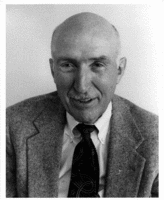 Edwin Bearss recently gave a talk called “The James: River of Lost Opportunities.”
Edwin Bearss recently gave a talk called “The James: River of Lost Opportunities.”Bearss did a good thing by shining the spotlight of noncooperation on the U.S. Navy in the James. (If you want more on this, to the extent of self-induced seasickness, seek out Rowena Reed's Combined Operations in the Civil War.)
I hope he did not play at even-handedness, blaming the Army in any way for not cooperating with the Navy, for that way lies bosh. The Peninsula Campaign was conceived as an amphibious landing project with large helpings of naval bombardment; this was minuted in conversations which were removed from Navy archives (Rowena Reed spotted the gaps). This first Richmond campaign inadvertently became an overland event in which all the perceived "failures" have come to rest on the shoulders of the army in the form of one George B. McClellan.
Three cheers for restored perspective.
But Bearss and I part company over the notion that the loss of Richmond in 1862 "might have put the Confederacy beyond life support.” With Davis, a Cabinet, some die-hard generals, plus loads of territory to relocate in, life support was abundant in 1862.
Doctorow becomes a Civil War novelist
 E.L. Doctorow (Ragtime), a 1970s New Yorker contributor cum historical novelist has the Civil War in mind. His new novel The March, is collecting its first reviews:
E.L. Doctorow (Ragtime), a 1970s New Yorker contributor cum historical novelist has the Civil War in mind. His new novel The March, is collecting its first reviews:Sherman's war-loving subordinate Justin "Kil" Kilpatrick blithely rapes and loots, finding a boy's excitement in bloody exigencies. [...] Doctorow patiently weaves these and several other stories together, while presenting military strategies (e.g., the "vise" formed by Sherman's gradual meeting with Grant's Army) with exemplary clarity. Behind it all stalks the brilliant, conflicted, "volatile" Sherman, to whom Doctorow gives this stunning climactic statement: "our civil war . . . is but a war after a war, a war before a war."What a nice tickling of our vague antiwar instincts. But I have failed to find this quote. Has it been fabricated for him?
Sherman was not a nihilist. He chose sides during the War of the Rebellion without resorting to dice or the flip of a coin. He believed in killing for a cause, an impossibility for those who think every war is but another war. Consider this thinking -
My aim, then, was to whip the rebels, to humble their pride, to follow them to their inmost recesses, and make them fear and dread us. Fear is the beginning of wisdom.Not the words of "just another war" speaking. And Civil War buffs, at whom Doctorow's publisher is now making lustful eyes, reject the notion that this was just another war.
But tell me that this is merely a Doctorow novel after a Doctorow novel before a Doctorow novel and I'm with you.
p.s. 8/18/05 - I assume Doctorow has "crafted" this quote in Sherman's voice. Brooks Simpson, co-editor of Sherman's Civil War: Selected Correspondence of William T. Sherman, 1860-1865 has commented on Usenet about this Doctorow quote, "I've never heard such a quote attributed to Sherman."
8/16/2005
Staggeringly good
What-if and what for
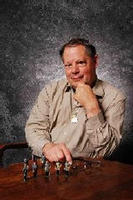 Enough good things have been happening the last few years such that you sometimes forget how preposterously bad the field of Civil War history is and remains.
Enough good things have been happening the last few years such that you sometimes forget how preposterously bad the field of Civil War history is and remains.Here are some interview nuggets from Roger L. Ransom, a California professor who has written a mass market what-if called The Confederate States of America: What Might Have Been.
If the war had gone better in the West, and if (Gen. Robert E.) Lee had avoided defeat at Gettysburg, the Confederates could have fought to a stalemate until the elections of 1864, when dissatisfied Northern voters would have elected a new president who would have been willing to negotiate an end to the war.Who still believes McClellan would have negotiated an end to the war? Why would they believe that? And if McClellan failed to make the cut and his running mate took office as president and there had been no Union victories in the west in 1864, we would have such a load of contingencies as to surpass even the loosest standards of what-if history.
[After peace] The Confederate States of America would have drawn up a constitution patterned on the U.S. Constitution with one obvious difference: The Confederate constitution would have explicitly defined slaves as propertyOddly enough, a CSA constitution was drawn up some years prior to 1864 - not that a researcher or teacher would know this - and section IX Article 4 states "No bill of attainder, ex post facto law, or law denying or impairing the right of property in negro slaves shall be passed." Ten points to our farseeing author.
One of the ironies of the war is that the Confederacy probably would have emancipated their slaves by the end of the century.Not really: in order to be ironic it would have had to happen. A contingency is ironic only in a literary sense.
Because the North was growing much faster than the South, the Confederacy would have sought long-term alliances with Britain and France, two countries that championed the War of Southern Independence.They did not, in any sense, at any time champion a "War of Southern Independence." I've never heard of a diplomatic study that held such a position.
But then, I would not have expected a rump Union to join the Central Powers in WWI, either, as Ransom does. Good grief.
Perhaps it's all in fun. Fun and profit. Neither of those is a stranger to Civil War publishing.
p.s. (8/18/05) Historian Mark Grimsley points out that I am reacting to an interview, not the book. He is reading this work and offers a more favorable impression. Note also that my inference here, that Ransom is not aware of the CSA wartime constitution, is contradicted by Ransom's own reference to same in Confederate States of America. See also this newer post.
Read a book before venting? It's on my to-do list.
8/15/2005
Technical difficulties
Back to normal tomorrow; thanks for dropping by.
Lincoln Museum slated for audit
The Illinois Capital Development Board has budgeted $500,000 to determine if the state is owed money from any of the contractors who worked on the Abraham Lincoln Presidential Library and Museum.The Board says it is not targeting BRC specifically but reports link the action to news items:
In addition to discovering the state's interest in recouping some of the project's cost, the [Chicago] Tribune found that BRC spent about $356,000 of its (state funding] proceeds to hire law and lobbying firms to negotiate with the state on its behalf. Using government funds to hire firms to lobby for more government funds is not common, Arnold said, but it's not unheard of with large-scale projects, either.
8/12/2005
Civil War bits and pieces
"We preserve a very specialized version of American history," said Michael Rhode, chief archivist. The museum is a gold mine for Civil War buffs. The Civil War exhibit greets visitors entering a 35,000-square-foot viewing area. It includes a lock of hair and skull fragments from Abraham Lincoln and the leg bone of Civil War Gen. Daniel Sickles lost at Gettysburg. [...] "The popular artifacts are a way to hook people and bring them in the door," said public affairs officer Steven Solomon.Lest we forget.
p.s. An email arrived since this was posted: "This warrants further investigation. After all, Grant said:'Garfield has shown that he is not possessed of the backbone of an angleworm.'"
The Civil War's Patrick O'Brien, cont.
 It looks like we may have another candidate for "the Civil War's Patrick O'Brien" - his name is David Poyer (right) and he has a huge fan currently way out on the International Space Station.
It looks like we may have another candidate for "the Civil War's Patrick O'Brien" - his name is David Poyer (right) and he has a huge fan currently way out on the International Space Station.His latest Civil War title is That Anvil of Our Souls: A Novel of the Monitor and the Merrimack (June '05), a mass market trade hardback that "extends his Civil War at Sea saga with this third installment."
Civil War medicine - not a lot of fun
* "Patients were not put to sleep; they were simply immobilized." Not sure if that's true across the board - maybe when chloroform stocks were low.
* "Young physicians saw the army as a way of education" - as they still do.
* "Some wounded were given gauze and morphine and then sent back to battle" - in my day, this was both practiced and parodied in the phrase "Take two aspirins and drive on." Gauze and morphine were carried by patrol medics.
* "When pus formed around a wound, doctors thought it was a good thing" - it still is, in the sense that the immune system is up and fighting.
* "A man had to have money to become a doctor..." Hello?
Friday housekeeping
(0) You can search within this site by using the little box in the upper left hand corner of any page.
(1) You can link to any post directly by clicking on its datestamp (at the bottom). That causes the post to come up in its own window with its own unique URL.
(2) This blog runs Mon - Fri. If nothing has been posted on a weekday, check into http://cwbn.blogthing.com. That's our emergency broadcast system.
(3) This as a consumer site concerned with "product" quality. It's also concerned with the product quality of "public history" in its various forms.
(4) There are plenty of clues around as to how to reach me if you wish to and I thank those who have taken that trouble.
(5) If my criticism is sometimes overdone, take it with a grain of salt. I regret any unnecessary harshness. A lot of bad history is produced by good people.
Thanks for visiting.
8/11/2005
What do you want in a tour book?
Eicher is too bright and analytical to keep inside the limits set by the editorial board of American Heritage so many decades ago. Witness some new thinking in his tour guide, revised and rereleased this month: Civil War Battlefields. The underlying concept is to tell the informed reader how much of the battle can be experienced at the battlefield park (how much of the battlefield is under management).
Witness also the monumental piece of research he and his father John collaborated on, Civil War High Commands. This book is so fundamental to ACW research and writing, it is hard to believe it came into existence as recently as 2001.
Make time for David Eicher.
Of crimes and flags
8/10/2005
ACW book sales 2005 - novel action
 Last year the paperback edition of Michael Shaara's Killer Angels sold about 58,000 copies. It's on track this year to do the same, having racked up around 28,000 sales through July. That's pretty good for a title released in August of 1987.
Last year the paperback edition of Michael Shaara's Killer Angels sold about 58,000 copies. It's on track this year to do the same, having racked up around 28,000 sales through July. That's pretty good for a title released in August of 1987.Jeff Shaara is doing less well by far but is still in great shape for a Civil War author. The softcover edition of Gods and Generals sold over 9,000 copies last year, way down from 46,000 or so the year previous. This year's sales are tracking last year's lower levels, with around 4,470 units sold by through July 2005.
So, Killer Angels remains a phenomenon.
When rookie novelist Newt Gingrich (top right) teamed with fantasy writer William Forstchen (bottom, left) to cash in on this phenomenon, I gave a yawn and a shrug. Their Gettysburg was released in June of 2003. How far would Gingrich's political friends and Forstchen's fanbase take them?
I don't know how the book did in 2003, but checking the hardback figures for 2004, the answer is "into nonfiction territory," with about 7,000 sales. That figure is lower this year, with just about 1,250 sales in mid-year, but okay for a trade hardback nonetheless.
Grant Comes East was released in June of '04; in the half-year it was available, it scored about 32,000 sales, rather like Sears' Gettysburg. As with the previous title, demand for the hardback fell off and this year about 2,500 copies have sold thus far. That's still good for a trade title, generally speaking.
Never Call Retreat is the third installment in this series and it was issued in June of this year. In the two months since it became available, I estimate 120,000 copies have sold. Not shipped, sold. In fact distributor Ingram has stocked another 7,000 cop
 ies in its warehouses to fill orders.
ies in its warehouses to fill orders.The Civil War reading public seems to love Gingrich and Forstchen. They are in Michael Shaara's league now, though they lack backlist staying power.
Is it right, however, to say that readers of alternative history novels are part of the Civil War reading public? At 120,000 units are we not seeing a massive crossover of readers from scifi and fantasy? If so, thank William Forstchen and cross this item off publishing's "strange but true" breakthroughs list.
(Gingrich makeover courtesy Rodney Anonymous.)
For writers only
Before that MS goes out the door, however, you may want to take a free online writing seminar offered by the Phantom Professor (no less) - in a delirium of optimism and goodwill; she's offering to help polish, polish and refine our prose:
Why am I doing this? Why not? As I watched my professor friends head back to classes, I just thought, "Why waste all the good stuff I've accumulated? Why not make it available for anyone who wants to do it?"
Gettysburg slideshow
Indie film shoots in Virginia
The passing tourist thinks it's a "Mosby Heritage Area" but it was also the seat of what might be called "Waterford's War."
8/09/2005
ACW book sales 2005 - Sears falters
 One of the striking developments this publishing season is the stumbling sales performance of Stephen W. Sears' books, Sears (right) being the sales leader of ACW trade publishing nonfiction.
One of the striking developments this publishing season is the stumbling sales performance of Stephen W. Sears' books, Sears (right) being the sales leader of ACW trade publishing nonfiction.It is part of the picture of general weakness in the Civil War book market.
Appearing in hardback in June 2003, his Gettysburg racked up a superb sales number of 29,000 by year's end. But by 2004, sales of the hardcover dropped to about 3,200 without being tapped by paperback readers (a paperback edition was not released until November of that year).
In the month or so it was available before Christmas, the softcover edition sold 4,700 copies, which again is excellent except that since January only a further 1,750 have been bought, overall a poor showing for a trade paperback.
In considering Sears' sales late last year in tandem with these new numbers, the pattern Gettysburg presents suggests that his fans are buying new hardcovers (they can't wait to read him) and that he had only a weak appeal to readers beyond this fan base, "the Gettysburg 30,000."
The Sears fan base is clearly not transferrable given the performance of another recent Sears project, the revision of Douglas Southall Freeman's classic Lee's Lieutenants. Sears actually removed the notes and "digressions" from Freeman's three-volume study so as to make a one-volume pop history easy-reader. Sears' Lieutenants was then issued in hardback by trade house Scribners in April of 2001. By 2003, when I began looking into it, it seems to have sold 550 copies or fewer - decent for a university imprint but unacceptable in the commercial sphere. In 2004, the level was about the same, give or take 50 copies. This year, the book is on track to reach the same low level, the Scribner's edition having sold roughly 240 units through July.
Now, it gets interesting. Scribners has issued no paperback edition of Lieutenants. And in April of this year, a discount house named Konecky issued another hardcover edition of Sears' version of Lee's Lieutenants in the "special value" category. The list price of this hardback would be less than half that of the new book standard (Konecky asks $14.98 full retail).
But the Konecky discount edition is now on summer clearance at B&N, having been re-released into the market just four months ago. It is selling for $7.19 on B&N. Scribners has ditched Sears' Lieutenants. Konecky is shipping at near cost.
Sears' reprints at Da Capo are doing poorly as well. Young Napoleon sold about 150 copies last year and none this year, despite renewed interest in McClellan and an impressive sales debut for Ethan Rafuse's McClellan's War. Some five copies of The Papers of George B. McClellan have sold. Houghton Mifflin reprinted Chancellorsville in paperback, a 1998 release, and sold about 1,050 last year and under 600 so far this year. These are decent sales scaled to a university press but unpalatable to a trade house. Gates of Richmond is on track to sell another 1,200 paperbacks this year as it did last year and Landscape Turned Red may again post 1,600 in sales.
What to make of it? Sears on the trade side and McPherson on the university press side have been pillars of Civil War publishing. With interest in Sears slipping and interest in trade newcomers like Winik sustaining, I would hope we are seeing readers searching out new thinking.
Ah, the paradigm shift. But the data is too uncertain for that kind of conclusion just yet. Maybe next year.
The top salesman at an independent record wholesaling firm (records, remember them?) once told me that a mega popstar's hits moved all sorts of records out of stores: spoken word, Mozart, everything. He said people would come to the store for the major release and buy all sorts of other stuff as well.
Is there a superstar like that in Civil War publishing? Oddly enough, the answer is yes, emphatically yes, someone whose public dwarfs that of Sears' and I have found him; but no, he is not moving other people's nonfiction because he writes fiction. There's some sort of disconnect that does not carry over. Maybe people go to the store for a hit novel and carry off other novels...
Perhaps you know which new author(s) I'm referring to. By the same token, you'd be surprised at whose numbers are falling dramatically on the Civil War fiction side.
More tomorrow when we do novels.
(Last year's posts on this subject are all linked here. Yesterday's post is here. If you need an overview about estimating and publishing terms, go here.)
Why we place Civil War markers
The sites are published on an annual map, and Edge said many people travel the trail. They also spend more then the average tourist. That's why Edge's group is trying to raise the money to put up two historical markers in Greene County, one at the U.S. 13/N.C. 903 intersection and another at the Scuffleton Bridge.
Flashman is back
"When all other trusts fail, turn to Flashman"- Abraham Lincoln
Jefferson Davis's birthplace ...
"Dog Jack" to be featured in film
The animal was an ardent Unionist who fought with the 102nd Pennsylvania Volunteer Infantry. He was exchanged for a Rebel private after being captured by the enemy.
Meanwhile no word from Ron Maxwell about completing the Last Full Measure.
8/08/2005
ACW book sales 2005 - the Winik factor
 Sometimes on this blog I make mention of Jay Winik (right) and the commercial success of his book April 1865: the Month that Saved America.
Sometimes on this blog I make mention of Jay Winik (right) and the commercial success of his book April 1865: the Month that Saved America.Since 2001, Winik has been passing unnoticed over the ACW publishing landscape at quite a high altitude. Two years after his book debuted, at which time I started tracking it, the hardback sold roughly 2,000 copies (estimated using my Ingram sales count, as are all figures on this page). That's a good third-year hardcover showing for a first Civil War nonfiction effort by an unkown "buff."
The trade paperback edition was issued in April 2002, and I have figured the 2003 sales figures at about 15,700. In that year, Oxford sold about 3,300 paperback editions of Battle Cry of Freedom and Knopf sold slightly fewer number of Shelby Foote's multivolume Civil War.
I hope, therefore, that you would agree that Winik is a phenomenon. No one had ever heard of him (or knows him now, except by word of mouth) and his content was offbeat. It showed the war shutting down in April 1865 not through the mechanism of an Appomattox surrender but through a series of individual decisions made by key Confederates opting not to continue the fight. It went against the grain of reader expectation arguing, "You don't understand how or why the Civil War ended."
Winik offers us "new thinking" wrapped in a sales breakthrough and the importance of that should be obvious.
Some gas is escaping Winik's balloon, albeit slowly. Perennial sold 8,730 or so of his paperbacks last year and this year (so far) I count 4,410 sold - with Christmas sales to come later in 2005. It is possible that Winik may not be far off reaching last year's levels. Those are solid commercial sales, even in decline. So Winik remains the sales leader in new ACW thinking.
Unfortunately, that recalls the saying about the one-eyed man being king of the blind.
Consider that April 1865 appeared as number 68 in a Barnes & Noble search on the keyword "Civil War" sorted by "best seller." His was the very first ACW nonfiction to appear on the list that was not a bargain book or on clearance (Foote's Civil War excepted).
So Winik is not only the sales champ for new thinking but for all ACW thinking, and at #68 that does not paint an pretty picture for potential Civil War book publishers. Worse, Winik's slight sales dip earthward in 2005 belies violent movements downward across the board among authors known and unkown, more on which tomorrow.
Previously in this series:
Prelude
Prelude 2
McClellan Rangers - hell yes!
When first formed the regiment had neither number nor company letters. The regimental number, as you know, would be assigned by the Commonwealth of Pennsylvania; until then the regiment took the name of the 'Ringgold Regiment.' As men arrived at Camp Lacey in Doylestown, PA they were placed in companies that were named, rather than lettered. The company commanded by William Warren Marple became Company C. The name of that company prior to the receipt of its letter was 'McClellan Rangers.' Therefore, we became the McClellan Rangers Reenactment Association.
Thus our name is a historical name. We required no display of intestinal fortitude to select that name. Nor do we have to spend inordinate amounts of time explaining our choice of name.
The reference source for the company name is Anonymous. 1861, Sept. 24. "Affairs at Camp Lacey." Bucks County Intelligencer. That newspaper article was retrieved at the Spruance Library of the Bucks County Historical Society, Doylestown, PA.
No new talent in Civil War history
Can you imagine how McPherson's former grad students must have felt to hear him say there is no new talent in Civil War history?Good point, but did he have grad students at Princeton? I have never heard of a Civil War era specialist coming out of Princeton.
Let me propose a few ideas:
Of course, there is a simple answer to the question, "Can you imagine how McPherson's former grad students must have felt?" "Terrible" and "they did this to themselves."* Many people attracted to Princeton to see McPherson would have gotten that out of their systems long before graduating.
* People enrolling under McPherson as grad students would have been self-selected as non-scholars (as people interested in pop history and storytelling) - not likely to break new ground.
* McPherson's basic stance is hostile to graduate studies; he believes the particulars of the ACW are all well established and that any work needed might be on the fringes of the discipline within the Centennial framework.
* McPherson's displays of personality suggest that he would not welcome a grad student whose intention it would be to write a better narrative history than Battle Cry ... which is a logical project for the kind of talent McPherson would attract.
8/05/2005
James M. McPherson, naval historian
 A friend of this blog sent me snippets of an interview with James M. McPherson (right). The usual elements of self-parody are leavened with disclosures embarassing to Gary Gallagher. My emphasis added.
A friend of this blog sent me snippets of an interview with James M. McPherson (right). The usual elements of self-parody are leavened with disclosures embarassing to Gary Gallagher. My emphasis added.Naval History: What do you see in the future for Civil War history? Is there a cadre out there to carry the torch from the likes of you and all the other well-known Civil War historians?
McPherson: Most of the people I know in the field right now are in their 40s or older. I can’t think of anybody younger coming along. So frankly, I don’t know. Maybe quite a few people are out there in their 30s or late 20s who just haven’t made a big impact yet and will do so in the next few years. If so, I’m not aware of them. I think there may be a decline in interest in the coming generation.
Naval History: We’ve heard you are at work on a Civil War naval book. Please tell us about the scope of it and when we might see it in print.
McPherson: This is a volume in the series Gary Gallagher ... is editing for the University of North Carolina Press. [...] About a dozen books are scheduled for the series, on the both the military and nonmilitary aspects of the war. Since I had become interested in the naval war, especially when I edited the Lamson letters with my wife Patricia a few years ago, I asked Gary if I could do the naval volume in his series.
[Interesting that McPherson would tell the deeply read subscribers of a naval history magazine that he was commissioned to write about ACW navies simply based on an expression of personal interest. See this exchange for yourself (registration required).]
Civil War book sales 2005 - prelude 2
This apparent softness cuts across all lines - nonfiction and fiction, megastars and new names. The effects on some Centennial doctrine standard bearers have been pronounced - Sears in particular. McPherson's case is also well worth revisiting.
Have a look at the best selling B&N titles for "Civil War." Skip past the novels, the summer specials, and the special discount editions and the first contemporary nondiscount nonfiction narrative is Shelby Foote's Civil War. After that, coming in at position number 58, Is Winik's April 1865. (Detzer's Allegiance is in the neighborhood but is on clearance.)
You have to get close to the hundredth place before new nonfiction titles start appearing. Even Battle Cry of Freedom is MIA.
Gory details start on Monday. Here is the previous post in this series.
Vintage seizes the moment
 Quality paperback publisher Vintage seems to be taking advantage of the publicity surrounding Shelby Foote's death - I walked into a Borders bookstore last night and found all of his novels stocked.
Quality paperback publisher Vintage seems to be taking advantage of the publicity surrounding Shelby Foote's death - I walked into a Borders bookstore last night and found all of his novels stocked.Picked out Follow Me Down for lakeside reading this weekend. At first it looked like a weak sister to Flannery O'Connor's The Violent Bear It Away; on closer inspection, it looked nothing like that. In fact it preceded Violent by five years.
Dipped into it last night and quickly laid it down - way too rich and tasty for browsing - needs my full attention.
Shelby Foote, I am very impressed.
8/04/2005
Bivouac Banner to remember Pohanka
"Offences Are Honored"
"McClellan Rangers" - bogus?
Shaara prize awarded
Ben "Beast" Butler - the movie
Now all we need is a script and a few Hollywood contacts.
SavasBeatie releases
Slated for release are Eric Wittenberg's The Battle of Monroe's Crossroads and the Civil War's Final Campaign; John Coski's Capital Navy: The Men, Ships, and Operations of the James River Squadron; and Timothy Smith's Champion Hill: Decisive Battle for Vicksburg.
I wish they would focus on the ACW entirely. One editorially strong house with good sales could turn the industry around. Why not strive for that?
Civil War book sales 2005 - prelude
You might want to review that material as we ease into a mid-year analysis of Civil War sales trends in 2005. That series will start later today or tomorrow and run for at least five posts.
To understand basic publishing lingo and the rule of thumb for estimating the sales of individual authors, be sure to read this in particular, and this too.
8/03/2005
More chaos in Goodwin's Lincoln project
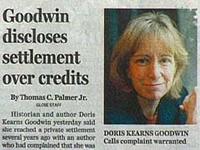 The Lincoln biography project due from rookie Lincoln writer Doris Kearns Goodwin in October has undergone its third name change in public.
The Lincoln biography project due from rookie Lincoln writer Doris Kearns Goodwin in October has undergone its third name change in public.When we began tracking this effort, it was called "The Uniter." This year the name was changed to "Master Among Men," as reported here previously.
The current name listed by publisher Simon & Schuster, Barnes & Noble, and Amazon shows the project's title has been changed to "Team of Rivals."
Was moviemaker Steven Spielberg alerted so he could rename his film (the one based on the unseen, unpublished book)?
The publisher's site lacks even a single line of description to help the buyer decide whether to advance order this work. However, when we go to the B&N page for the book, we find description that suggests that it has been recast from an Abraham Lincoln bio - what the public has been expecting - to a group portrait of Seward, Chase, Bates (!), and Lincoln. A short blurb from the Library Journal on the same page confirms that this is "a multiple portrait that includes William Seward, Salmon P. Chase, and Edward Bates."
On a comical note, I'm pleased to see the publisher considers the Seward, Chase and Bates of 1860 "political visionaries whose national reputations towered over Lincoln's."
Does this mean Goodwin delivered her manuscript? Only Simon & Schuster's chief editor Michael Korda knows for sure.
The new preservation - "amenities"
Stafford County VA now has a group called Friends of Stafford Civil War Sites and it is authorized to use the county seal.
For developers, the possible benefits of working with the friends group are threefold ... A builder can avoid construction delays, lower its costs for archaeology and planning, and use a site's historical significance to help market houses. And those who buy their homes can enjoy the marked, preserved historical sites as a community amenity. [Emphasis added.]This is a negotiated surrender - "we can't raise money to buy land outright and set it aside, so let's cut some quick deals."
Let's not surrender that fast.
The McClellan Rangers
It took guts to give a re-enactment group that name; they must spend half their jamboree time apologizing for it.
McPherson is phoning it in - update
Forty-something War Between the States enthusiasts crowded around a speaker phone Monday night to hear the "gospel" about the Civil War from Dr. James M. McPherson of Princeton University.Gospel, mind you.
8/02/2005
Being "utterly incapable of judging correctly"
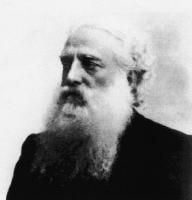 Buddhist Col. Henry Steele Olcott (right) is remembered, for reasons not entirely clear, by the Fredericksburg daily.
Buddhist Col. Henry Steele Olcott (right) is remembered, for reasons not entirely clear, by the Fredericksburg daily.The most famous of Burnside's staff officers, he became a tool of Stanton and Chase during the war conducting politically useful "corruption" investigations on the anti-Fremont model.
Friends, like R.B. Westbrook tried to salvage part of his reputation after he went off the deep end into Theosophy:
I then believed and now know that he was so far under the strange influence of that ambitious adventuress [Madame] Blavatsky [the spiritualist], as to be utterly incapable of judging correctly anything that she might say or do. He (like many adherents to false, tricky materializing mediums) was a monomaniac. He was as crazy as a loon on everything relating to Blavatskyism, though perfectly sane on every other subject.Sounds almost like the political exercise of Republican radicalism. One could similarly be under the spell of Wade, Stanton or Chase, whether or not personal ambition was engaged. And a person once bewitched, like one once hypnotized, might be more susceptible in the future.
That it is possible to be utterly untrustworthy upon one subject, and yet honorable and true on all others, I know from long observation and experience as a lawyer.This is the tragedy of the human condition, writ large in the American Civil War.
Let's pretend to do grave maintenance
According to this story,
In 1872, the [Cannon] family built a cemetery near the northeast corner of Mound and 26 Mile [in Macomb County, MI]. In addition to the bodies of Civil War veterans, the daughter of a man who fought in the American Revolution is buried there.A DAR member went to the district attorney:
In 1979, Cannon family members and local DAR members signed an agreement by which the Cannon family established a trust fund of about $20,000 of stock and cash. Principal was to be left alone, while interest would be used "for the exclusive and only use of maintaining and covering the upkeep" of the cemetery.
Carollyn Andren last year accused fellow DAR members of spending $32,088 in cemetery trust money for members' trips to Washington, D.C., for a chapter luncheon and for other non-cemetery chapter projects in the '80s and '90s. Andren said the non-cemetery spending amounted to more than the $30,069 the chapter spent on maintaining the 1-acre cemetery with graves of Civil War veterans since the mid-1980s.There will be no prosecution. (1) The statute of limitations has run out on some charges; (2) [DA] "Bittner said Friday that the DAR's non-cemetery expenditures were OK."
There's a nice multipurposing angle, too:
Andren accused chapter members of selling $4,170 of trust stock in 1999 to raise money to pay the $5,520 cost of a DAR luncheon as well as make donations to the Boy Scouts, Girl Scouts, the Mt. Clemens' library and other charitable causes.[Emphasis added.]Aaah, isn't that sweet? The underlying principal was generating so much grave maintenance money it had to be culled and the proceeds spread around town - to charities and agencies where DAR members might be employed either now or in the future. Yay community spirit!
If you think this has nothing to do with your own donations and bequests to other non-profit and ACW organizations, pardon my cynicism.
8/01/2005
Oprah vs. Mac
In the continuing evolution of McClellan as a vaudeville character Make Your Own Luck co-authors Eileen C. Shapiro, a strategic consultant, and Howard H. Stevenson, a Harvard University professor tell us,
As most Civil War buffs know, that devastating national upheaval might have abruptly ended at the battle of Antietam in September 1862 if Gen. George McClellan had not been so cautious.They're probably right about "most" buffs "knowing" this. But they are not interested in correcting the problem this kind of "knowledge".
McClellan wasted time checking with the War Department higher-ups and President Lincoln before attacking. By that time Lee had rearranged and consolidated his troops to make them less vulnerable to McClellan’s assault.I recall him informing his betters after-the-fact. I recall him brushing off the false intelligence pressed upon him by Halleck and Gov. Curtin during the advance. I recall differently.
"The U.S. Civil War could have been ended that week in September 1862. Instead, it dragged on for close to another three years, ultimately costing a total of 558,000 military deaths, more than the sum of all U.S. military in all other wars including the Revolutionary War, both World Wars, and subsequent wars in Korea, Vietnam, and Iraq," the authors write.
McClellan: author of 558,000 military deaths. Don't laugh, it gets Lincoln and Davis off the hook.
If some buffs think that, let them convince the rest of us that (1) armies could be annihilated in 1862 (2) with immediate political consequences (3) and GBM had the sole opportunity to do so. You don't get a free pass after asserting hypotheticals.
Personally, I favor the historic answer as to how the war might have ended before 1865: with the capture or killing of Jefferson Davis and the Confederate Cabinet and any generals willing to set up a junta should the first two events occur. I let the events of April 1865 teach me something about how American Civil Wars might end.
Which takes McClellan criticism to a whole new level.